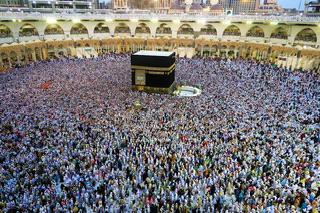Record Haj numbers: 2.5 million pilgrims expected in Mecca
Filed the restrictions imposed to contain Covid-19, Saudi authorities speak of an edition with numbers higher than before the pandemic. From religious tourism and pilgrimages at least 12 billion dollars in the Wahhabi kingdom's coffers. The climate of détente with Tehran favours a return of Iranian believers. More than 32 thousand health workers ready to intervene in case of emergencies.
Riyadh (AsiaNews) - A "record-breaking" pilgrimage, with numbers even higher than those recorded in the years preceding the Covid-19 pandemic and the restrictions that have characterised the editions of recent years.
Under these auspices the Hajj opened yesterday, the major pilgrimage to Mecca, the most important holy place in Islam and which, according to the Saudi authorities, in 2023 will record "the highest" influx of believers "in history" exceeding the maximum reached so far of 2.5 million.
In 2020, in a context of global lockdowns and closures for the Coronavirus, Riyadh has limited the event to a few thousand citizens and local residents.
In contrast, last year there was a vaccination requirement for participants. This is the first year that it is back at full capacity and without any special restrictions, for an event that ends with the feast of Eid al-Adha (of sacrifice), when Muslims slaughter cattle and distribute the meat to the poor.
Pilgrimages to Mecca (Hajj and Umrah) represent a substantial source of income for Saudi Arabia, which under Crown Prince Mohammad bin Salman (Mbs) has embarked on an ambitious reform programme to free the economy from oil revenues.
The flow of tourists and worshippers to the holy sites of Islam guarantees revenues of more than 12 billion dollars every year, for an event that besides the religious element also holds profound value from an economic and political point of view.
The rituals associated with the Hajj began yesterday and will end between the evening of 30 June and 1 July, when the new moon of the month of Dhul Hijjah, the twelfth and last in the Islamic calendar, should be seen. This year, one of the main challenges will be the weather, with days when the temperature is expected to reach 45 degrees Celsius and above, adding to the record number of pilgrims and creating the conditions for critical moments in terms of health and public order.
This is why Riyadh has allocated more than 32 thousand nurses and doctors, thousands of ambulances scattered at strategic points in the city and along the route taken by the faithful to treat cases of heatstroke, dehydration and fatigue that are anything but rare.
I am living the best days of my life,' Abdelazim, a 65-year-old Egyptian who has been saving money for the past 20 years to reach the ,000 needed to make the major pilgrimage to Mecca, confided to Afp. Yesterday evening, the faithful began the journey to Mina, some 8 km away from the Great Mosque of Mecca, before gathering at Mount Arafat where the Prophet Muhammad is believed to have delivered his final sermon.
Lastly, the 2023 edition is characterised by the climate of détente and the resumption of diplomatic relations between the Saudis (the reference point of Sunni Islam in the world) and Iran, which has a Shiite majority, while at the same time guaranteeing an improvement in services for pilgrims. Sayid Mahdi, in charge of the approximately 2,800 worshippers expected by the Islamic Republic, confirms the climate of greater "cooperation" with the authorities in Riyadh in the search for accommodation and the organisation of logistics. Mohammed Hossaini, one of the Iranian participants in the Hajj, has already been on Saudi territory for four days to celebrate the Hajj and the Umrah (the minor pilgrimage) in one trip. 'I am very happy,' he says, 'that relations between the governments of Iran and Saudi Arabia are improving.... This will also improve the journey of Muslims to the house of God'.
The major pilgrimage (Hajj) is one of the five pillars of the Islamic faith, and every Muslim is obliged to make it at least once in his life.
In the past it has been used by Riyadh as a political weapon, denying entry visas and participation to Iranian (Shia) or Syrian worshippers because of the war. It has also been the scene of incidents or attacks, resulting in thousands of deaths: in 2015 a stampede through the crowd claimed at least 2,300 lives; in 2006 more than 360 pilgrims died during the stoning ritual, in which pilgrims throw stones and pebbles at three tombstones symbolising the rejection of Satan; in 1989 a double attack outside the great mosque resulted in one fatality and 16 wounded, and 16 Kuwaiti nationals were executed for the attack.
11/08/2017 20:05







.png)










